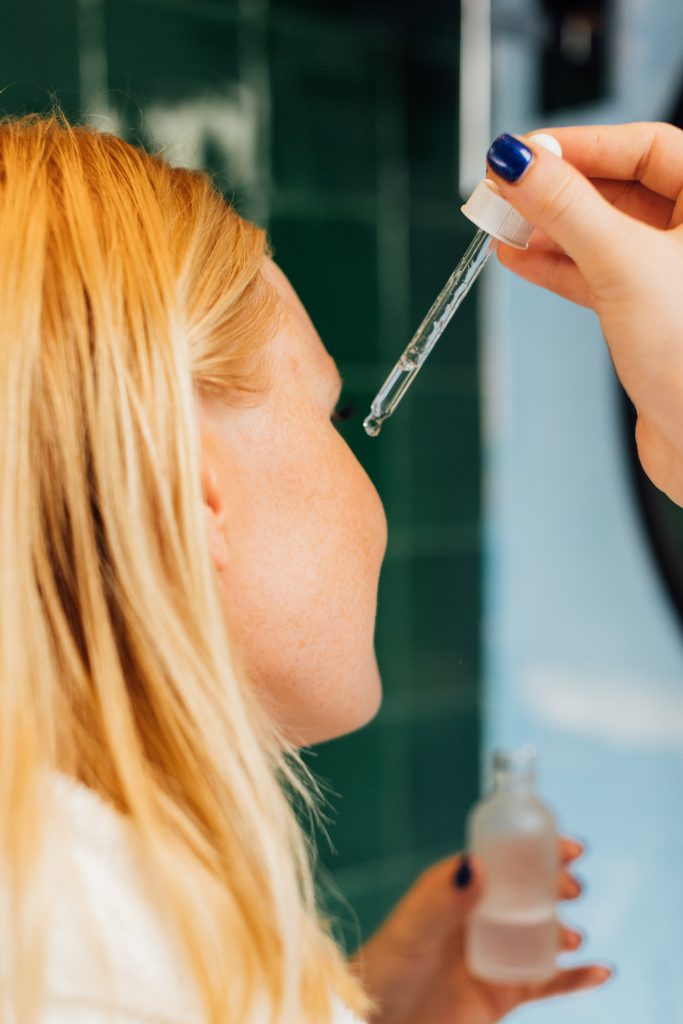Learn about the amazing benefits of incorporating facial oils into your skincare routine.
Discover the Benefits of Using Facial Oils
If you think facial oils are the enemy, think again! These tiny bottles of magic are the key to achieving radiant and healthy skin. So, let’s dive into the world of facial oils and explore the amazing benefits they offer.

Understanding Facial Oils
Facial oils have been a skincare secret for centuries. Why? Because they are packed with powerful ingredients that nourish and hydrate your skin without leaving it feeling greasy. But what exactly are facial oils?
Facial oils are not a new concept, in fact, they have been used in skincare routines for centuries. The ancient Egyptians were known to use oils like olive oil and sesame oil to keep their skin looking radiant and youthful. These oils were believed to have healing properties and were used to protect the skin from harsh environmental conditions.
Today, facial oils have become a staple in many skincare routines. They are lightweight, non-comedogenic oils that work wonders for your skin. They are made from various plant extracts and essential oils that are rich in vitamins and antioxidants. These oils penetrate deeply into your skin, providing hydration and nourishment from within.
What are Facial Oils?
Facial oils are not just any ordinary oils. They are carefully formulated to provide specific benefits to your skin. The key is in the ingredients. Facial oils are made from a blend of natural oils that are chosen for their unique properties.
For example, argan oil is known for its high vitamin E content, which helps to moisturize and soften the skin. It also contains antioxidants that protect the skin from free radicals, which can cause premature aging.
Rosehip oil, on the other hand, is rich in essential fatty acids, such as omega-3 and omega-6. These fatty acids help to repair and regenerate skin cells, making it a great option for those with acne scars or sun-damaged skin.
Jojoba oil is another popular choice, as it closely resembles the skin’s natural sebum. This means that it is easily absorbed and helps to balance the skin’s oil production. It is also rich in vitamins A, D, and E, which help to nourish and protect the skin.
Marula oil is known for its high antioxidant content, which helps to fight off free radicals and protect the skin from environmental damage. It is also rich in fatty acids, which help to moisturize and soften the skin.
Different Types of Facial Oils
With so many different types of facial oils available, it can be overwhelming to choose the right one for your skin. Each oil offers different properties that cater to specific skin concerns.
If you have dry skin, you may benefit from using a heavier oil, such as argan oil or marula oil. These oils provide intense hydration and help to lock in moisture, leaving your skin feeling soft and supple.
If you have oily or acne-prone skin, you may want to opt for a lighter oil, such as jojoba oil. This oil is non-comedogenic, meaning it won’t clog your pores, and it helps to regulate your skin’s oil production.
If you have sensitive skin, you may want to choose an oil that is gentle and soothing, such as rosehip oil. This oil is known for its calming properties and can help to reduce redness and inflammation.
Now that you understand the different types of facial oils and their benefits, you can choose the right one for your skin. Incorporating a facial oil into your skincare routine can help to nourish and hydrate your skin, leaving it looking healthy and radiant.
The Science Behind Facial Oils
Ever wondered how facial oils manage to keep your skin looking flawless? It’s all about the science, my friend. Let’s take a closer look at how facial oils work.
Facial oils work by forming a protective barrier on the skin’s surface. This barrier locks in moisture, preventing water loss and keeping your skin hydrated throughout the day. The result? A plump and radiant complexion that screams healthy skin goals.
But how exactly do facial oils create this barrier? It all comes down to the unique properties of the oils themselves. Unlike traditional moisturizers, which are water-based, facial oils are lipid-based. This means that they are made up of molecules that are similar to the natural oils produced by your skin.
When you apply a facial oil, these lipid molecules are able to penetrate the outermost layer of your skin, known as the stratum corneum. Once inside, they create a thin film that acts as a shield, preventing moisture from evaporating into the air. This not only keeps your skin hydrated, but also helps to seal in any other skincare products you may have applied, allowing them to work more effectively.
The Role of Essential Fatty Acids
Essential fatty acids are the superheroes of facial oils. These fatty acids, such as omega-3 and omega-6, play a vital role in maintaining the health and integrity of your skin. They strengthen the skin’s natural barrier, reducing inflammation and promoting a youthful glow.
But what exactly are essential fatty acids, and why are they so important for our skin? Essential fatty acids are a type of fat that our bodies cannot produce on their own, meaning that we need to obtain them from external sources, such as food or skincare products. These fatty acids are crucial for the structure and function of our cell membranes, which are responsible for keeping our skin cells healthy and functioning properly.
When it comes to facial oils, essential fatty acids are often derived from plant-based sources, such as argan oil, rosehip oil, or jojoba oil. These oils are rich in omega-3 and omega-6 fatty acids, which have been shown to have numerous benefits for the skin. Not only do they help to strengthen the skin’s natural barrier, but they also have anti-inflammatory properties, which can help to calm and soothe irritated skin.
Furthermore, essential fatty acids are also known for their ability to improve the overall texture and appearance of the skin. They have been shown to promote collagen production, which can help to reduce the appearance of fine lines and wrinkles. Additionally, they can help to regulate oil production, making them suitable for all skin types, including those with oily or acne-prone skin.
In conclusion, facial oils are not just another skincare trend. They are backed by science and have been proven to provide numerous benefits for the skin. By forming a protective barrier and harnessing the power of essential fatty acids, facial oils can help to keep your skin hydrated, youthful, and glowing. So, the next time you reach for your favorite facial oil, remember the science behind it and embrace the beauty it brings.
Key Benefits of Using Facial Oils
Now that we understand the science behind facial oils, let’s dive into the delightful benefits they offer. Trust us, these benefits will make you fall head-over-heels in love with facial oils.
Facial oils have gained immense popularity in the world of skincare, and for good reason. They offer a wide range of benefits that can transform your skin and give you that coveted healthy glow. From hydration and nourishment to anti-aging properties and oil-balancing effects, facial oils have got you covered.
Hydration and Nourishment
Say goodbye to dry and dull skin! Facial oils provide deep hydration, making your skin look plumper and more supple. They penetrate deep into the layers of your skin, delivering essential moisture and nutrients. With regular use, you’ll notice a significant improvement in the overall texture and appearance of your skin.
But that’s not all. Facial oils also nourish your skin with essential vitamins and antioxidants. These powerful ingredients help to repair and rejuvenate damaged skin cells, promoting a healthier complexion. They work their magic from within, giving your skin a radiant and youthful glow.
Anti-Aging Properties
Who doesn’t want to turn back the clock on aging? Facial oils are here to help! Their potent antioxidants help fight free radicals, reducing the appearance of fine lines and wrinkles. Free radicals, which are unstable molecules, can wreak havoc on your skin, causing premature aging. Facial oils act as a shield, protecting your skin from these harmful molecules and keeping your skin looking youthful and vibrant.
Additionally, facial oils improve the elasticity of your skin. As we age, our skin loses its natural elasticity, leading to sagging and drooping. The nourishing properties of facial oils help to restore and maintain the elasticity of your skin, giving it a firm and youthful appearance. You’ll notice a visible difference in the tightness and smoothness of your skin.
Balancing Oil Production
Contrary to popular belief, facial oils can actually help balance oil production in your skin. It may sound counterintuitive to apply oil to oily skin, but it works wonders. When your skin is adequately hydrated, it produces less sebum (the oil your skin naturally produces). This means fewer breakouts and less shine.
Facial oils have the ability to regulate your skin’s natural oil production, preventing it from going into overdrive. They provide the necessary hydration without clogging your pores, allowing your skin to find its balance. So, say goodbye to excessive oiliness and hello to a beautifully balanced complexion.
Now that you know the incredible benefits of facial oils, it’s time to incorporate them into your skincare routine. Whether you have dry, oily, or combination skin, there’s a facial oil out there that’s perfect for you. So go ahead, indulge in the luxurious world of facial oils and let your skin reap the rewards.
Choosing the Right Facial Oil for Your Skin Type
Not all facial oils are created equal. Just like people, they come in different types, and you need to find the perfect match for your skin type. Let’s explore which facial oil is the best fit for you.

Facial Oils for Dry Skin
If you have dry skin, look for facial oils that are rich in nourishing ingredients like argan oil or rosehip oil. These oils provide intense hydration and help restore the skin’s natural moisture barrier. Your skin will drink up these oils and thank you with a radiant and plump complexion.
Facial Oils for Oily Skin
Yes, even oily skin can benefit from facial oils! Opt for lightweight oils like jojoba oil or grapeseed oil. These oils mimic the skin’s natural sebum, tricking your skin into producing less oil. Sounds like a winning strategy, right? It is.
Facial Oils for Sensitive Skin
Sensitive skin requires a gentle touch. Look for facial oils that are non-irritating and soothing, such as chamomile oil or calendula oil. These calming oils will nourish and protect your sensitive skin without causing any redness or irritation.
How to Incorporate Facial Oils into Your Skincare Routine
Now that you’ve found the perfect facial oil, it’s time to add it to your skincare routine. But how and when should you use it? Let’s break it down.
When to Apply Facial Oil
Facial oils should be the last step in your skincare routine. Apply them after cleansing, toning, and moisturizing. This allows the oil to seal in all the goodness from your previous skincare steps.
The Correct Way to Use Facial Oil
When applying facial oil, take a few drops in the palm of your hand and gently massage it into your face using upward motions. Don’t forget to include your neck and décolletage for that all-around glow. Allow the oil to absorb for a few minutes before applying makeup or heading off to bed.
Incorporating facial oils into your skincare routine is a game-changer. Say goodbye to dull, dry skin and hello to a dewy and radiant complexion. So, why not give facial oils a try? Your skin will thank you – and you’ll be rocking the glow of your dreams in no time!





